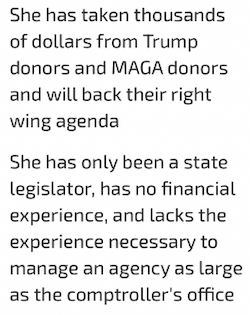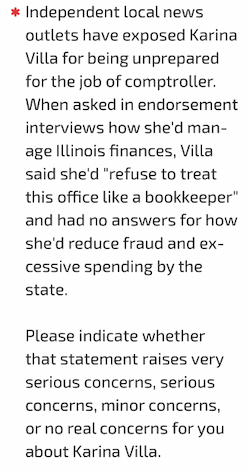* The crypto-backed PAC Fairshake has begun airing this anti-Stratton ad…
* Stratton held an “emergency Press conference” this afternoon to address the crypto-backed ad. From the media advisory…
Today, February 27, 2026 at 12 PM, Juliana Stratton and supporters will gather in Daley Plaza for an emergency press conference in response to the recent news that a MAGA-funded, crypto industry super PAC is spending millions of dollars against Juliana in support of Raja Krishnamoorthi’s campaign for Senate.
Juliana will call on Raja to reject the MAGA money and make sure everyone knows that Raja is for sale, and Illinois isn’t buying it.
From Stratton’s remarks…
We deserve better than the MAGA-backed special interest trying to put their thumb on the scale of this race, and I hope my opponent would agree with that, so I am calling on Congressman Krishnamoorthi to immediately call for the ads to be taken down and reject this MAGA support. And if he’s not willing to do that, well that tells you exactly where he stands.
…Adding… From Raja…
Juliana Stratton’s hypocrisy reached new heights today as her team convened a desperate press conference to boost her “struggling” campaign. […]
What’s more: When asked about her hypocrisy by a reporter, Stratton’s team immediately cut the livestream.
And that’s why we don’t have Q and A from the event.
…Adding… We have obtained a copy of the Q and A…
Reporter: The poll you pointed to as momentum was paid for by the Democratic Lieutenant Governor’s Association, a group that has taken money from many corporate PACS, direct money from corporations. How is that different from what Congressman Krishnamoorthi is doing? And should you tell the DLGA to stop taking corporate PAC money and direct contributions from corporations?
Stratton: Well, the DLGA, as you know, is the Democratic Lieutenant Governor’s Association. I’m a Democratic Lieutenant Governor. They have been supportive because of the work that we have done in Illinois, what I’ve done alongside Governor Pritzker to raise wages, protect reproductive freedom, create thousands of good paying jobs. But what I would say is that the DLGA has said that they are returning those funds, and I’ve said I support that, and I’m glad that they made that decision. But what is also clear is that Congressman Krishnamorthi, in a very different way, has picked up the phone and called these entities directly, called the CTO of Palentir. He’s done that for the last seven years, and he’s done it including while Palantir was in our communities, wreaking havoc and inflicting terror in our communities. So I am not accepting any corporate PAC money in this race, and I have upheld that commitment.
Reporter: A PAC that you started accepted corporate PAC money and a pack of supporting you have accepted corporate practice? Should you send a clear signal to your supporters not to continue taking that money, regardless?
Stratton: I’m not taking any corporate PAC money in this race, and I’ve upheld this commitment.
Reporter: But you’ve a lot about about-
Staff member: We’ve got other people, sorry can we let somebody else ask a question right now?
Reporter keeps going: Jennifer Pritzker [cross talk] gave a million dollars to a super PAC that is backing you. She has obviously turned against the president now, but she was a supporter of President Donald Trump and many Republican candidates over the years. Is that MAGA money? And should Illinois Future return the million dollars that is received from Jennifer Pritzker?
Stratton: I cannot coordinate, as you know, with anything else, but what I’m saying is I am not taking corporate PAC money. And what we are seeing happening in this race right now is Raja Krishnamoorthi saw the momentum of this campaign. He sees that we are now two points within reaching up after $25,000,000 and 10 years of accepting corporate PAC dollars. People are fed up with this. They want to see somebody who’s going to fight for the people. And that’s exactly what I’m going to do.
A different reporter: When I talk to voters they’re really concerned about high prices, high interest rates. I have not talked to any voters who is talking about the inside baseball, who’s getting what from what MAGA donors. Do you think that is going to sour? [can’t hear the rest]
Stratton: Well, let me tell you what I’m hearing from voters every single day. They want to make sure that Congress is working for the people, and many of them are feeling very frustrated and fed up, quite frankly, that too often we see people get elected and then forget who they were elected to represent so much corporate PAC money that corporate special interests get the red carpet rolled out for them, and every day, Illinoisans get left behind. Do we have some incredible leaders here today who are fighting for the people. And I’m going to join in Washington, DC to make sure that people always stay at the center of what I do.
Please pardon any transcription errors.
* New Raja digital ad…
Today, Raja for Illinois released a new digital ad, “The Interview,” exposing Juliana Stratton’s hypocrisy and the truth about her decision to accept corporate PAC money after promising voters she wouldn’t.
When confronted in a WCPT radio interview earlier this month, Stratton was asked a straightforward question about where the PAC money backing her campaign was coming from. Instead of answering, she unraveled — stumbling over her words, contradicting herself, and failing to defend her broken promise.
“Where’s the super PAC money coming from?” asked the radio host in the new spot. “It seems to me most of it is coming from corporations and wealthy individuals.”
“All of the corporate money is from public donors. Excuse me… the… uh, PAC money is from corporate donors… excuse me… all of the PAC money is from public donors,” said Stratton, struggling to keep her story straight to WCPT.
For six months, Stratton has attempted to distract from her own record by running a near-exclusively negative campaign targeting Raja, hypocritically attacking him in ads, on debate stages, in interviews, on social media, in desperate fundraising pleas, and more. Now, Illinois voters can see the truth for themselves — in her own words
I’m pretty sure I posted about that awkward exchange at the time. Click here to watch the ad.
* Rep. Kelly makes a good point about the amount of outside money being dumped into this US Senate campaign. But she won her first congressional primary in 2013 (a special election to replace Jesse Jackson, Jr.) mainly because Mike Bloomberg dumped $2.3 million via his Independence USA super PAC into the race…
* As we’ve already discussed, Sen. Karina Villa’s first TV ad takes a quick swipe at two of her opponents, Rep. Margaret Croke and Lake County Treasurer Holly Kim.
Anyway, a subscriber was polled last night. From the looks of things, Croke or somebody backing her may be gearing up to thwack Villa. This question was about Democratic comptroller candidate Rep. Margaret Croke…

* But then the “concerns” questions switched to Sen. Villa…



* Politico…
Congresswoman Lauren Underwood’s Farm Team PAC is endorsing Karina Villa for state comptroller and Saba Haider the state House seat in the 84th District now held by state Rep. Stephanie Kifowit. […]
Democrat Raja Krishnamoorthi has been endorsed by Alexander County Dem Chair Phillip Matthews and the National Committee to Preserve Social Security and Medicare.





















